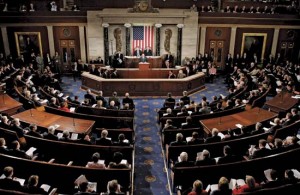Revisiting Humphrey Hawkins
Posted on November 18, 2010
 On the eve of St. Patrick’s Day in 1978, the New York Times reported that the House approved by legislation, which established the official policy of the United States, that the unemployment rate should be 4%. “The bill authorizes the use of fiscal and monetary policy, public service jobs, job training and counseling and all other means to achieve full employment…The legislation was supported by a coalition of labor, civil right, liberal, religious and women’s groups and was backed by President Carter.” Amendments offered by Republicans to require a balanced budget and achieve an inflation goal of 3% were rejected, and most GOPers voted against final passage of the bill, calling it an empty promise.
On the eve of St. Patrick’s Day in 1978, the New York Times reported that the House approved by legislation, which established the official policy of the United States, that the unemployment rate should be 4%. “The bill authorizes the use of fiscal and monetary policy, public service jobs, job training and counseling and all other means to achieve full employment…The legislation was supported by a coalition of labor, civil right, liberal, religious and women’s groups and was backed by President Carter.” Amendments offered by Republicans to require a balanced budget and achieve an inflation goal of 3% were rejected, and most GOPers voted against final passage of the bill, calling it an empty promise.The key emotional moment in the debate came when Senator Muriel Humphrey, Hubert Humphrey’s widow, came onto the House floor to a thunderous round of applause.
Of course, the Humphrey Hawkins law wasn’t enough to save President Carter, who ended up getting bounced out of office two short years later. Mr. Carter’s economic policies did him in, as stagnant growth, high inflation and high unemployment conspired to kill his reelection campaign.
In August of 1979, Carter appointed Paul Volcker as the Chairmen of the Federal Reserve, and Volcker actually focused first on the Republican agenda, which was bringing down inflation. An inflation rate that peaked at 13.5% under Carter sank to an annual rate of 3% under Reagan.
Humphrey-Hawkins expired in 2000, but the name lives on because it is still the official policy of the United States that the Federal Reserve should focus on both a sound monetary policy and on economic growth leading to full employment, oftentimes contradictory mandates. And just as under Humphrey-Hawkins, the Federal Reserve Chairman has to traipse down to both the House and the Senate and explain why his policies aren’t working to create full employment.
Mike Pence and Bob Corker have offered legislation to change the Fed’s mission from the demands of the Humphrey Hawkins. They want the Fed Chairman to protect the value of the currency, not engage in phony growth strategies that distort the marketplace. The Hill newspaper reported yesterday, “Corker, a member of the Senate Banking Committee, said that the Fed’s mission of maintaining full employment while keeping inflation low represents an “overly broad” agenda. “It is time that we work to clarify the mandate of the Federal Reserve,” he said in a statement. “Providing our central bank with a clear and explicit focus on keeping inflation low will serve America better than the broader-mandate approach we have today.””
The Hill also quoted Mike Pence, who introduced similar legislation in the House, “The Fed’s dual-mandate policy has failed,” Pence said. “For a record 18th straight month, the nation’s unemployment rate is at or above 9.4 percent. It’s time for the Fed to be solely focused on price stability and not the recently announced QE2, which will monetize our debt and trigger inflation.”
I am not an economist, but it seems to me that Pence and Corker are on to something. While an overly strong dollar can have a dampening impact on exports, an overly weak dollar will have impact on the buying power of all American consumers, many of who are in no position to deal with the higher prices that come from inflation.
The Fed has done all it can do to create economic growth in this country, and frankly it shouldn’t do any more. Interest rates are already too low (especially if you are a senior citizen who is trying to get income from savings), and the threat of inflation is too high in the coming years.
The Humphrey Hawkins law didn’t save Jimmy Carter and it won’t save Barack Obama. The government should let the private sector get to the work of creating jobs. It can do that by providing more certainty about its future tax policies, by stopping government intrusion through job-killing regulations, and by guarding against rampant inflation in the future.
When Humphrey Hawkins was first passed in the House 33 years ago, Republicans called it an empty promise. It is still an empty promise, and it should be repealed once and for all.
